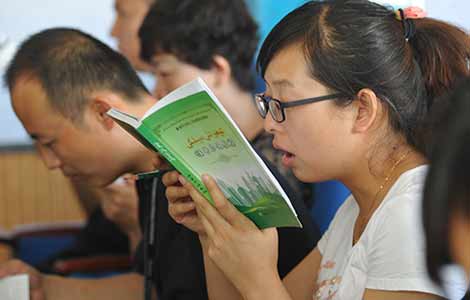Power points
Updated: 2013-08-09 09:19
By Andrew Moody (China Daily)
|
|||||||||||
"I think China has focused too much on defining its relations with the United States in the past three to five years and has not paid enough attention to diplomatic relations with its Asian neighbors," he says.
"Within Chinese universities there is a lot of knowledge of the United States and also Japan but we need to focus much more on developing relations with countries like Myanmar, India, Mongolia, South Korea and also nations in Southeast Asia. This is where we should build our influence."
Shambaugh argues that one of China's weaknesses is its failure to understand "soft power", a term originated by Harvard University's Joseph Nye.
He says that China sees it as something that "can be bought with money or built with investment" with an estimated $7 to $10 billion spent per year on "overseas publicity work", according to the author.
James B. Heimowitz, who was hired to work on China's image during the Beijing Olympics when he was president and CEO for North Asia of public relations giant Hill & Knowlton, says that attempting to buy soft power is not something that should be derided because it is precisely what a lot of companies do to improve their brand image.
"My view is that those people who have been successful in building their influence or what is called 'soft power' have put both resources and money behind it," he says.
"I think if China is putting money against this then it is certainly a step in the right direction. If they are a bit rough around the edges or not as nimble and sophisticated as others in applying that money then they will have to learn how to do it better but to imply it can't be bought, I disagree."
Zhao Minghao, research fellow at the China Center for Contemporary World Studies, the Communist Party of China think tank, does see a greater role for Chinese soft power in extending the country's influence in the world.
"Many people here talk about soft power; even in the Party congress report and the government work report, there is reference to soft power. China has many resources for soft power and they have to find a way to use these resources.
"Chinese traditional culture, philosophy, even Chinese food, which is universal like Coca Cola or KFC, is a form of soft power. "
Jacques, a former editor of Marxism Today and deputy editor of The Independent, does not believe that China should be unduly concerned with this type of power.
"I think Nye is a greatly over-estimated writer. If you want to be a political or military power on a regional or a global basis then you must have economic power but there is always a lag," he says.
"Britain developed a huge empire and became a great naval power because it had the first industrial revolution. US economic development for more than a century after the American Civil War led to it becoming a superpower after 1945 when it ended its isolationism. The Soviet Union collapsed like a pack of cards after 1990 because it didn't have economic power to underpin its military strength."
He insists that real influence is nothing to do with selling McDonald's everywhere or having an international audience for films.
"India has Bollywood but that doesn't make it a great power. It will be China's economic strength that will lead to it having real power and influence in the world since that is what ultimately matters," he says.
Heimowitz says how a country is viewed abroad need not be a barrier to its commercial success, something proved to some extent by the acceptance of Japanese products in China. "I would say that Japan faced far greater challenges than China because it had to overcome deep-seated animosities in Asia and particularly in the China market.
"People, however, trust Japanese brands to deliver quality and they are willing to overlook whatever feelings they have toward Japan," he says.
Niall Ferguson, professor of history at Harvard University and author of Civilization: the West and the Rest, believes that China is on the way back to shaping the world.
"I think China is going to become the biggest economy in the world in a matter of less than 10 years and that this is an almost unstoppable outcome," he says.
"I don't think we are going back to 1411 (the height of China's Ming Dynasty (1368-1644) supremacy) because that would imply a massive economic preponderance of China but I think we are going to be living in a time where there will be real parity for the first time since the early modern period."
The best-selling British historian insists there is a complacency in the United States about the rise of China.
"People in Washington say (about China) that they need us as much as we need them so there is no problem. I say they are wrong.
"China needs the American consumer much less than it did 10 years ago. China has a plan and it is no secret because they publish it to shift away from a reliance on exports to the West and toward more domestic consumption. There is no guarantee the Chinese will continue to fund the federal deficit," he says.
Some believe the relative slowdown of the China economy will actually give the Chinese leadership the time to think more clearly about China's role in the world.
Odd Arne Westad, professor of international history at the London School of Economics and author of Restless Empire, China and the World since 1750, says it could avoid having such a heavy responsibility placed on it too soon.
"The slowing down of the general hyper growth that China has been going through over the past 30 years is probably a good thing because it forces the Chinese leadership to think in a much more hard and sober way about what China is going to do internationally.
"With great-power status comes greater responsibility but it will now happen more gradually and it is a reminder that China's economic tree doesn't grow into heaven."
Today's Top News
New green policy gives industries a big boost
Northeast China braces for major floods
Launches highlight India's ambitions
Chinese put on alert in Afghanistan
Social media counters papers
China to boost green industries
Go-between helped to cement key tire deal
Japan to carry out self-defense
Hot Topics
Lunar probe , China growth forecasts, Emission rules get tougher, China seen through 'colored lens', International board,
Editor's Picks

|

|

|

|

|

|





